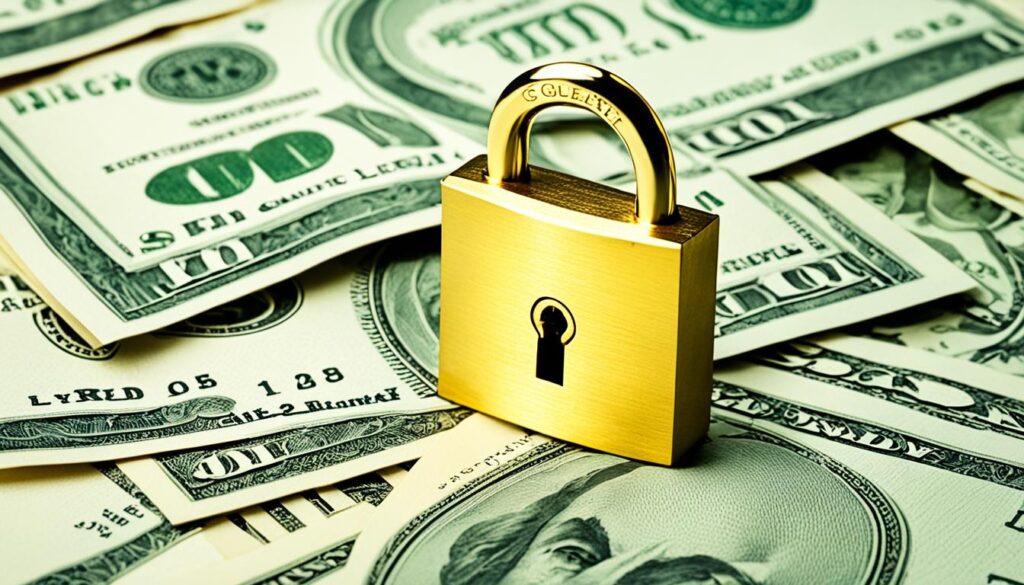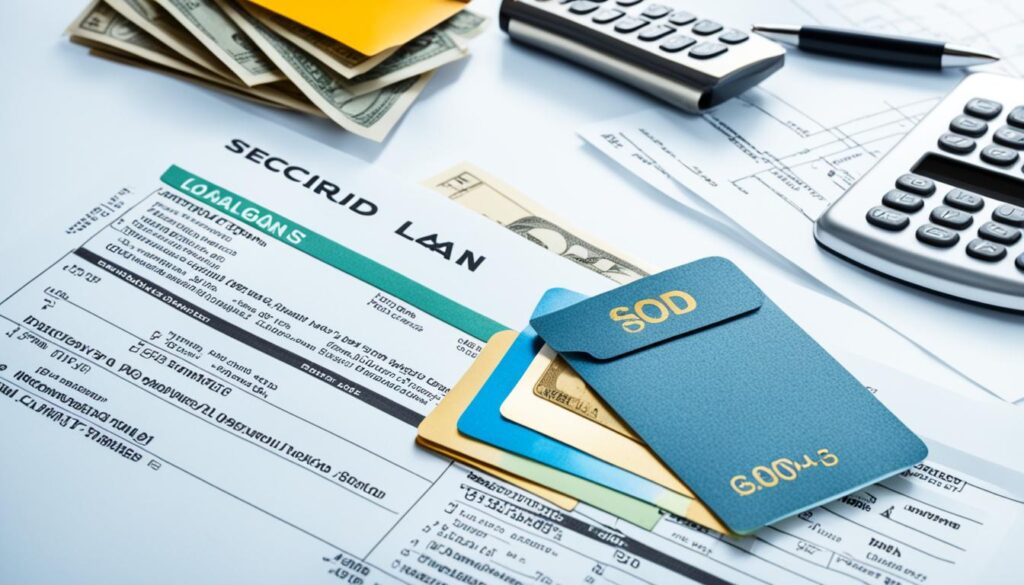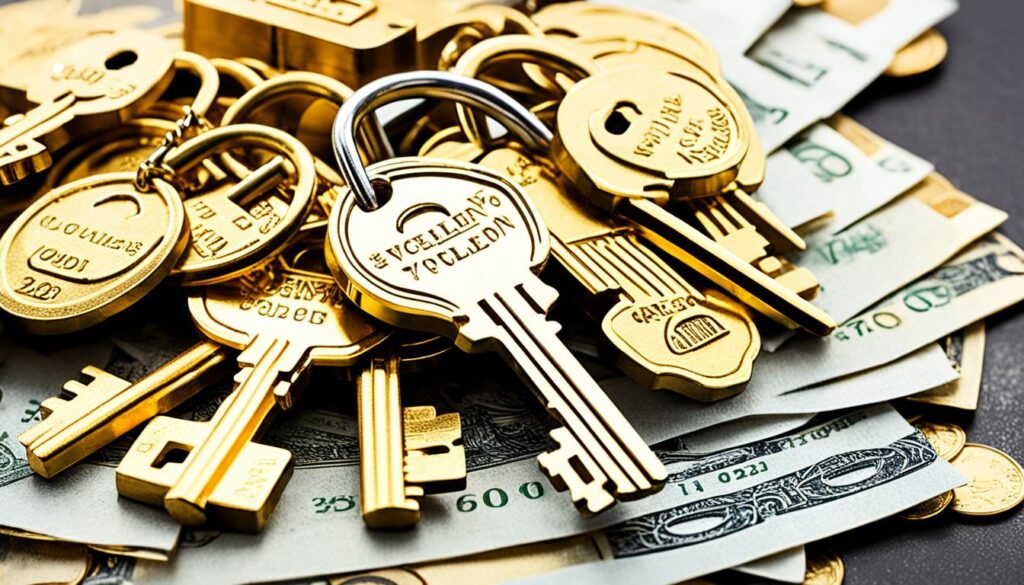Secured loans provide a reliable solution for achieving your financial goals. Unlike unsecured loans, secured loans require collateral, providing lenders with added security. By leveraging your assets, such as your house, car, or valuable possessions, you can gain access to the funds you need to accomplish your objectives. Lenders will consider your credit score when determining the terms of the loan, so it’s essential to maintain a good credit score to secure favorable loan conditions.
Key Takeaways:
- Secured loans require collateral and offer added security for lenders.
- Collateral can take the form of a house, car, or other valuable assets.
- To secure favorable loan terms, it’s important to maintain a good credit score.
- Secured loans provide a reliable solution for accessing funds to achieve your financial goals.
- By leveraging your assets, you can unlock the financial opportunities you need.
Understanding Secured Loans
Secured loans are a type of loan that requires collateral. Collateral is an asset that is pledged to the lender in case the borrower defaults on the loan. This provides security for the lender, making secured loans less risky for them.
How Collateral Works
Collateral can take various forms, including a house, car, savings account, or other valuable assets. By pledging collateral, borrowers provide assurance to the lender that they will repay the loan. If the borrower fails to make timely payments, the lender has the right to seize and sell the collateral to recover their money.
Lenders consider a borrower’s credit score and financial history when determining the terms of a secured loan. A good credit score can help secure a lower interest rate and better loan terms. On the other hand, a lower credit score may result in higher interest rates or stricter loan conditions.
Secured loans provide lenders with added security, allowing them to offer more favorable terms to borrowers. However, it’s essential to carefully consider the risks involved, as defaulting on the loan could result in the loss of valuable assets.
Types of Collateral
Collateral can vary depending on the lender and the loan type. The most common forms of collateral include real estate (such as a house or property) and vehicles (such as cars or motorcycles). Additionally, savings accounts, investment accounts, jewelry, or art pieces can also serve as collateral.
Obtaining a Secured Loan
Secured loans can be obtained from various lenders, including banks, credit unions, and online lenders. Each lender has different requirements and loan terms, so it’s important to compare offers before making a decision.
Benefits of a Secured Loan
Secured loans offer several advantages to borrowers. By providing collateral, borrowers can typically access larger loan amounts and secure lower interest rates compared to unsecured loans. Furthermore, secured loans can be a viable option for individuals with lower credit scores or limited credit history.
Understanding the Risks
- Defaulting on a secured loan can result in the loss of collateral
- Interest rates may vary depending on the borrower’s credit score
The Importance of Credit Score
A good credit score is crucial for securing favorable loan terms. Lenders consider a borrower’s credit score as an indication of their creditworthiness. A higher credit score demonstrates responsible financial behavior and increases the chances of obtaining better loan terms.
Benefits of Secured Loans

Secured loans offer several benefits to borrowers. Firstly, by using collateral, borrowers can often secure larger loan amounts and lower interest rates compared to unsecured loans. This is because the collateral reduces the risk for the lender.
Additionally, secured loans can help borrowers with lower credit scores or limited credit history access financing that might not otherwise be available to them. This is because the collateral provides reassurance to the lender, making them more willing to extend credit.
Moreover, repaying a secured loan responsibly can have a positive impact on your credit score. By making consistent on-time payments, you demonstrate financial responsibility to creditors, potentially improving your creditworthiness and expanding your future borrowing opportunities.
“Secured loans offer borrowers the ability to access larger loan amounts and lower interest rates by providing collateral, while also providing an opportunity to improve their credit score through responsible repayment.”
Key Benefits of Secured Loans:
- Higher loan amounts
- Lower interest rates
- Access to financing for borrowers with lower credit scores or limited credit history
- Potential credit score improvement through responsible repayment
Overall, secured loans provide a viable solution for individuals seeking larger loan amounts, favorable interest rates, and opportunities to improve their credit score. By offering collateral, borrowers can mitigate lender risk and unlock financial possibilities.
| Benefits of Secured Loans |
|---|
| Higher loan amounts |
| Lower interest rates |
| Access to financing for borrowers with lower credit scores or limited credit history |
| Potential credit score improvement through responsible repayment |
With these benefits in mind, individuals can confidently explore secured loans as an option to meet their financial needs.
How Secured Loans Work

Secured loans operate on a unique principle that sets them apart from unsecured loans. To obtain a secured loan, the borrower must provide collateral as a form of security for the lender. Collateral can take various forms, such as real estate, vehicles, or other valuable assets. This collateral serves as a guarantee to the lender that they will be repaid, even if the borrower defaults on the loan.
If the borrower fails to repay the loan, the lender has the legal right to seize and sell the collateral to recover their money. This ensures that the lender is protected from potential losses due to default.
The loan amount and interest rate for secured loans are determined based on several factors, including the borrower’s credit score, the value of the collateral, and the specific policies of the lender. A higher credit score may result in more favorable loan terms, such as a lower interest rate or higher loan amount.
Before considering a secured loan, it’s essential to carefully evaluate your ability to repay the loan. Defaulting on a secured loan can have severe consequences, including the potential loss of your valuable collateral. Therefore, it’s crucial to assess your financial situation and ensure you have the means to repay the loan before proceeding.
Secured loans provide lenders with added security by requiring collateral from borrowers. This lowers the risk for lenders and allows them to offer more favorable loan terms, such as lower interest rates. However, borrowers must consider the potential consequences of defaulting on a secured loan, as it may result in the loss of their collateral.
Advantages of Secured Loans
- Lower interest rates compared to unsecured loans
- Potentially larger loan amounts
- Accessible financing for borrowers with lower credit scores
Disadvantages of Secured Loans
- Risk of losing collateral in case of default
- Requires valuable assets as collateral
- May have stricter eligibility requirements
By fully understanding how secured loans work and considering their advantages and disadvantages, borrowers can make informed decisions when seeking financing for their specific needs. It’s important to choose a reputable lender and carefully assess your financial situation to ensure that a secured loan is the right choice for you.
Types of Collateral for Secured Loans

Collateral is an essential aspect of secured loans, providing lenders with added security in case the borrower defaults on the loan. There are various types of collateral that borrowers can use to secure their loans, depending on the lender’s requirements and the specific terms of the loan.
The most common forms of collateral for secured loans include:
- Real Estate: Houses, properties, and land are often used as collateral for secured loans. The value of the real estate will be assessed by the lender to determine the loan amount.
- Vehicles: Cars, motorcycles, boats, or other vehicles can be pledged as collateral. The lender may require the borrower to provide proof of ownership and assess the vehicle’s value before approving the loan.
- Savings Accounts: Some lenders accept savings accounts or certificates of deposit as collateral. These types of collateral allow borrowers to keep their funds intact while securing a loan.
- Investment Accounts: Certain lenders may consider investment accounts, such as stocks, bonds, or mutual funds, as collateral. The borrower usually needs to provide documentation of the investment’s value.
- Valuable Personal Property: Items like jewelry, artwork, or collectibles can serve as collateral for secured loans. These assets may need to be appraised to determine their value.
The choice of collateral will depend on factors such as the lender’s policies and the borrower’s assets. It’s crucial to understand the specific requirements for collateral before applying for a secured loan. Additionally, the value of the collateral will influence the loan amount and the interest rate offered by the lender.
To illustrate the various types of collateral for secured loans, here is a visually engaging table:
| Type of Collateral | Description |
|---|---|
| Real Estate | Houses, properties, land |
| Vehicles | Cars, motorcycles, boats |
| Savings Accounts | Bank savings accounts, certificates of deposit |
| Investment Accounts | Stocks, bonds, mutual funds |
| Valuable Personal Property | Jewelry, artwork, collectibles |
Here is an image that visually represents the different types of collateral for secured loans:
When considering a secured loan, it’s important to evaluate the value and viability of the collateral you can provide. This will not only affect the loan terms but also ensure that you can comfortably meet the repayment obligations.
Where to Get Secured Loans

When you’re in need of a secured loan, there are several options to consider. Traditional banks, credit unions, and online lenders all offer secured loans tailored to your specific financial needs. Whether you prefer the personalized service of a local bank, the convenience of an online lender, or the community-focused approach of a credit union, finding the right lender is crucial to securing the best loan terms for your situation.
Traditional Banks and Credit Unions
Traditional banks and credit unions have long been trusted sources for secured loans. These institutions typically provide a wide range of financial products, including secured loans, with competitive interest rates and personal assistance throughout the loan process. Banks and credit unions often take the time to understand your financial goals and overall creditworthiness, enabling them to offer personalized loan options that fit your needs and budget. This personalized approach can make the application process smoother and help you secure a loan that aligns with your specific objectives.
Online Lenders
Online lenders have become increasingly popular due to their quick and convenient loan application process. With just a few clicks, you can compare loan offers from multiple online lenders, finding the best rates and terms for your secured loan. Online lenders streamline the application process and provide fast approval, making it an attractive option for those seeking convenience and efficiency. However, it’s essential to research and verify the legitimacy and reputation of online lenders before proceeding with your loan application to ensure their credibility and protect your financial interests.
Comparing Loan Terms
When considering where to get a secured loan, it’s essential to compare loan terms from different lenders. Take the time to review interest rates, repayment terms, and any additional fees or charges associated with the loan. Responding to multiple loan offers and carefully considering their terms will enable you to make an informed decision and choose the lender that best meets your financial requirements.
| Lender | Interest Rates | Loan Amounts | Application Process |
|---|---|---|---|
| Traditional Banks | Competitive rates | Varies based on collateral | Personalized assistance, in-person or online |
| Credit Unions | Competitive rates | Varies based on collateral | Community-focused, personalized service |
| Online Lenders | Varies, competitive rates available | Varies based on collateral | Quick and convenient online application process |
Remember, securing the best loan terms for your secured loan involves researching and comparing offers from various lenders. Take advantage of the available resources to make an informed decision that aligns with your financial goals and needs.
Applying for a Secured Loan
When it comes to applying for a secured loan, there are a few steps you’ll need to follow. First and foremost, it’s important to gather all the necessary documents before beginning the application process. These documents typically include proof of income, identification, and details about the collateral you’ll be providing.
Once you have all your documents in order, you can proceed to fill out the loan application form. This form will require you to provide personal information such as your name, address, and contact details. You’ll also need to provide information about the secured loan you wish to apply for, including the desired loan amount and the purpose of the loan.
It’s important to be thorough and accurate when filling out the loan application form. Double-check all the information you provide to ensure there are no mistakes or discrepancies. This will help speed up the processing time and increase your chances of getting approved.
Once you’ve completed the application form, you’ll need to submit it to the lender. This can typically be done either online through the lender’s website or in person at a branch location. Make sure to follow the submission instructions provided by the lender to ensure your application is received and processed correctly.
Once your application has been submitted, the lender will begin the review process. They will evaluate your eligibility based on factors such as your credit score, income, and the value of the collateral you’re providing. This review process may take some time, so it’s important to be patient.
During the review process, the lender may contact you for additional information or clarification if needed. Make sure to promptly respond to any requests to keep the application process moving forward smoothly.
Once the lender has completed their review, they will make a decision on whether to approve your secured loan application. If approved, you’ll be notified of the loan terms, including the interest rate, loan amount, repayment schedule, and any additional fees or charges.
If your application is approved, the next step is to carefully review the loan terms and conditions before accepting the offer. Take the time to understand the obligations and responsibilities associated with the secured loan to ensure it aligns with your financial goals and capabilities.
If you choose to accept the loan offer, you may be required to provide additional documentation or undergo further verification before the loan can be disbursed. Once all the necessary requirements have been fulfilled, the lender will finalize the loan and disburse the funds to you.
It’s important to note that the application and approval process for secured loans may vary between lenders. It’s always recommended to compare multiple lenders and loan offers to find the best fit for your needs.
Repaying a Secured Loan

Once you’ve obtained a secured loan, it’s important to understand the repayment terms to ensure you can fulfill your financial obligations. Repayment terms for secured loans can vary depending on the lender and the specific loan agreement.
Typically, borrowers are required to make monthly payments towards the loan amount. These payments include both the principal amount borrowed and the interest accrued over the loan term. It’s crucial to make these loan payments on time and in full to avoid defaulting on the loan.
Defaulting on a secured loan can have serious consequences. If you fail to repay the loan per the agreed terms, the lender has the right to seize and sell the collateral you provided. This allows them to recover the money they lent to you, and you may lose your valuable assets.
It’s crucial to carefully consider your financial situation and ensure that you have the means to repay the loan before taking it out. Evaluate your income, expenses, and any other financial obligations to determine if you’ll be able to make the monthly loan payments without straining your budget.
Planning and budgeting can help you stay on track with your loan repayments. Make sure to prioritize your loan payments and include them in your monthly budget. If possible, consider setting up automatic payments to ensure you don’t miss any due dates.
Secured Loan Repayment Tips:
- Create a budget that includes your loan payments
- Stick to your budget and avoid unnecessary expenses
- Consider making extra payments to pay off the loan faster
- Communicate with your lender if you’re facing financial difficulties
- Monitor your credit score and address any inaccuracies
Benefits of Repaying a Secured Loan:
Repaying a secured loan responsibly can have several benefits:
- Improve your credit score: Making payments on time and in full can help improve your credit score over time. This can open up more financial opportunities for you in the future.
- Build a positive repayment history: Consistently repaying your loan demonstrates your responsible financial behavior and can make it easier for you to access credit in the future.
- Maintain ownership of collateral: By making loan payments as agreed, you retain ownership of the collateral you provided. This ensures that you can continue to enjoy the benefits and use of the asset.
Remember, repaying a secured loan is a long-term commitment. Carefully assess your financial situation and prioritize making timely payments to successfully repay your loan while safeguarding your assets.
Pros and Cons of Secured Loans

Secured loans have their pros and cons. On the one hand, they offer the benefit of lower interest rates and larger loan amounts compared to unsecured loans. By providing collateral, borrowers can secure a secured loan with more favorable terms and lower interest rates, making it a cost-effective option for financing various needs. This benefit stems from the reduced risk for lenders, as the collateral serves as a form of security. With lower interest rates, borrowers can save money over the life of the loan and potentially pay off the debt faster.
Secured loans offer borrowers the potential to secure larger loan amounts, making it an attractive option for those in need of significant funds. Additionally, the lower interest rates can result in lower monthly payments, easing the financial burden on borrowers. This can be particularly advantageous for individuals with lower credit scores or limited credit history, as secured loans are often more accessible compared to unsecured loans.
On the other hand, it is important to consider the potential cons of secured loans. The main disadvantage is the risk of losing your collateral if you fail to repay the loan. In the event of loan default, the lender has the right to seize and sell the collateral to recover the outstanding debt. This poses a significant risk, especially if the collateral holds sentimental or financial value to the borrower.
It is crucial to carefully assess and evaluate the risks and benefits before taking out a secured loan. Consider your ability to repay the loan and the impact it may have on your financial situation. If you are confident in your ability to meet the repayment obligations, the benefits of a secured loan can outweigh the risks.
At a Glance: Pros and Cons of Secured Loans
| Pros | Cons |
|---|---|
| Lower interest rates | Risk of collateral loss |
| Larger loan amounts | Potential impact on credit score |
| Accessible to borrowers with lower credit scores | Possible loss of sentimental or financial assets |
Overall, secured loans can be a valuable financial tool for those who require larger loan amounts and favorable interest rates. However, it is essential to thoroughly consider the risks associated with collateral loss and make an informed decision based on your specific financial situation.
Also Read : How To Prequalify For A Personal Loan Fast
Conclusion
Secured loans can be a valuable financial tool for achieving your goals. By providing collateral, borrowers can access larger loan amounts and lower interest rates compared to unsecured loans. This is especially beneficial for individuals with a lower credit score, as the collateral serves as security for the lender.
However, it’s important to carefully consider your ability to repay the loan and the risks involved in case of default. Failure to repay the loan can result in the lender seizing and selling the collateral to recover their money. Therefore, it’s crucial to assess your financial situation and ensure that you have the means to make the required loan payments.
When seeking a secured loan, it’s essential to work with a reputable lender. Take the time to understand the terms and conditions of the loan, including the interest rate, repayment period, and any additional fees. By making informed decisions and working with a reliable lender, you can leverage secured loans to unlock your financial goals and improve your credit score over time.
FAQs
Q: What are secured loans and how do they work?
A: Secured loans are loans that require collateral, such as a car or home, to secure the loan amount. If the borrower fails to repay the loan, the lender can take possession of the collateral to recoup their losses.
Q: What types of collateral can be used for a secured personal loan?
A: Collateral for a secured personal loan can include a vehicle, valuable jewelry, real estate, or any other high-value asset that the lender can liquidate if the borrower defaults on the loan.
Q: Can I get a secured loan with bad credit?
A: Yes, it is possible to get a secured loan with bad credit as the collateral provides security for the lender. However, the interest rates may be higher for individuals with poor credit.
Q: How do secured loans differ from unsecured loans?
A: Secured loans require collateral to back the loan amount, while unsecured loans do not require any collateral and are based solely on the borrower’s creditworthiness.
Q: What are the best secured personal loans available in the market?
A: The best secured personal loans depend on individual financial situations and credit scores. It’s recommended to compare offers from different lenders to find the most favorable terms.
Q: Can I use my savings as collateral for a secured loan?
A: Yes, savings can be used as collateral for a secured loan. Some lenders offer savings-secured loans where the funds in a savings account serve as collateral for the loan.
Q: What happens if I default on a secured loan?
A: If you default on a secured loan, the lender has the right to seize the collateral used to secure the loan. It can lead to negative consequences on your credit score and financial stability.
Q: What are the common types of secured loans?
A: Common types of secured loans include auto loans, home equity loans, car title loans, and secured credit cards.
Q: How can I use my assets as collateral for a loan?
A: You can use your assets, such as a home or car, as collateral for a secured loan. This provides security to the lender, making it easier for you to qualify for the loan.
Q: Can I apply for a secured personal loan at a federal credit union?
A: Yes, federal credit unions often offer secured personal loan options to their members. These loans can help you build credit while providing you with the funds you need.
Q: What is the benefit of taking out a secured loan to build credit?
A: Secured loans are a good way to build credit because they require collateral, making them less risky for lenders. By making timely payments on a secured loan, you can improve your credit score over time.
Q: Do secured loans require collateral?
A: Yes, secured loans require collateral to secure the loan amount. This collateral can be in the form of assets like a car, home, or savings account.
Q: How do I calculate my loan payments for a secured loan?
A: You can use a personal loan calculator to determine your monthly payments for a secured loan based on the loan amount, interest rate, and term of the loan.
Q: What are the best credit options for securing a loan?
A: The best credit options for securing a loan typically involve having a good credit score, sufficient income, and valuable collateral to offer to the lender.
Source Links
- https://medium.com/@nuestro/unlock-your-dreams-with-personal-loans-b4b8ee322776
- https://www.linkedin.com/pulse/unlocking-power-personal-loans-your-path-financial-freedom-indicred
- https://www.thefundingfamily.com/blog/easiest-personal-loans-to-get-in-2024